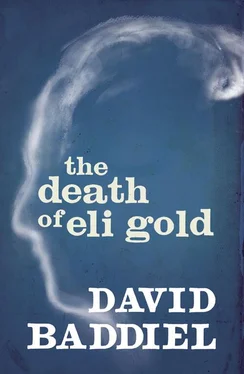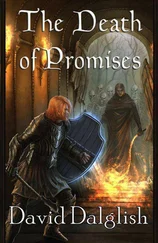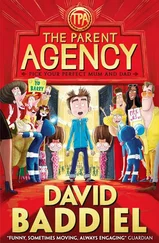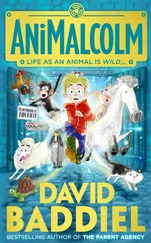‘What’s your name?’ she said, because she wanted to know, but also because she wanted to be released from his gaze. He smiled, a wider grin than she expected, bringing his nose down over his mouth: he looked suddenly medieval, cartoonish.
‘I shall answer that in what I believe is the customary manner.’ He spoke in an exaggerated cut-glass English accent, waving his left hand in a florid eighteenth-century style. Before Violet had time to react, he stood on tiptoe, lifting the still aflame lighter above his head. It was only then that she realized he was quite a tall man: he had been slouching against the post, and bending down in order to have the conversation with her. He seemed to Violet almost to uncoil.
Her eyes went upwards, to the low ceiling of this section of the Rainbow Corner. Lifting the Zippo to the ceiling created a circle of light, revealing a messy sprawl of signatures, doodles and numbers burnt into the plaster, written by GIs keen to preserve something of themselves in this foreign country, before war or peace took them away. Dodds, 98205D she read, before the flame in the man’s hand began to move, forming a blackening line that slowly became the upright pillar of an ‘E’. Despite the general smokiness of the room, she could detect in her nostrils the acrid smell of burning plaster. A couple of other American soldiers, noticing this familiar custom being performed, clapped and cheered. The man – El someone, it seemed: was he Spanish? – seemed to be absorbed in his task. Most of the names on the ceiling were just scrawls, bearing the marks of having been written on tiptoe, in public and by drunken hands; he had the appearance, however, of deep concentration, as if he were Michelangelo on his back at the Sistine Chapel. The words were bold and clear, and he spent long enough on each letter to burn it thickly into the wood: it looked, by the end, more like an imprint, more like the International Shipbrokers company stamp that her fist had to plonk down over and over again on the envelopes at work, than letters inscribed by hand – by flame. When he had finished, he spent a little while looking up at his name, admiring his handiwork. Violet noticed that he didn’t have a very protruding Adam’s apple – there was no triangular skin stretch in the gullet pressing against his extended neck – which made her glad, as her previous boyfriend had done, and the feel of it pressing against her throat when they were kissing had always put her off.
‘Eli Gold …’ she said, intoning the words, brushing her blonde hair out of her eyes as she tilted her head back to read.
‘E- li ,’ he said. He pronounced it ‘lie’. She had said ‘Ely’, like the town.
‘That’s a funny name.’
‘Is it? Eli, Eli, lema sabachtani .’
‘Beg pardon?’
‘It means God. Literally …’ And here he raised the lighter to the ceiling again, although this time unlit, ‘… Elia , the Highest.’
‘In what language?’
Eli’s face creased, his smile revealing his face to be lined for his age.
Somehow, it did not make him look old.
‘Hebrew, of course. Elia ’s own language.’
‘Hebrew?’
‘I’m Jewish. On my father’s side.’
‘Oh,’ said Violet, who – having occasionally made the journey from her parents’ house in Walthamstow to Spitalfields for meat and vegetables – had seen some Jews, but only the ones in the big black hats with the curly sideburns. ‘I thought you were an American.’
Eli looked at her, his composure for the first time dented. The lines around his eyes all went upwards, as he stared at Violet’s pretty, open, easy face, a face standing firmly behind the straightforwardness, the frank neutrality, of her statement. Then he laughed, loud, long peals that seemed to drown out even the brass section of the Bill Ambrose band. Violet felt frightened, but unfathomably drawn to the fear. She looked up at his name, still smoking on the ceiling. A swell hit her soul and, as can happen in moments of epiphany, she thought she saw this moment as it would be described years from now, saying to friends, perhaps to children, that it was as if he had been burning the words Eli Gold into her heart. And she did say that, to friends if not to children, and soon came to believe that such was indeed the true quality of her experience. It was only later she realized that Eli had just been writing.
* * *
He is not certain he should be wearing black, in summer. It is not the heat – that is not bothering him, though he is used to the white chill of Utah – but thinks that it might, somehow, give him away. When, earlier, he had ventured into the hospital reception area, an orderly had looked at him suspiciously. This is paradoxical, as he is wearing it to fit in. Where he comes from, no one wears black: not even any of the younger, trendier Mormons, in their younger, trendier sects, the Bullaites, or Zions Order Inc., or The Restoration Church. But he is wearing it, because his third wife, Dovetta, told him that that was the first thing she noticed when she went to New York on her mission trip, On Fire for Christ : everyone wears black.
He wears a black jacket and a black T-shirt. Blue jeans, though. That feels self-conscious, as well, because he is fifty-five, perhaps too old for jeans. Although everyone wears jeans now, even old men; even old women. They hang off them, off their legs. This sense of himself as old, an old man in blue jeans, disturbs him. Not through vanity, even though he used to be a handsome man, and maybe still is, despite the stuck eye. It disturbs him because of the task ahead.
A lot of journalists and photographers are still milling about after the doctor’s statement. Some of them clearly think he is one of them. He has to be a little careful not to be seen in the back of shot when the TV cameras are around. He doesn’t want to be spotted by somebody, somewhere, on some Summit County TV, who might recognize him and question why on earth he is there, knowing that he could not be a well-wisher, or a mourner. Also, when the doctor was talking – when he was going on about blood cell counts and secondary infections and how the hospital was doing everything that could be done – he felt an urge to shout: to heckle. At the words ‘Mount Sinai Hospital understands the responsibility it has been given in caring for this particular patient’ the urge had felt almost uncontrollable; but he used the mental effort of memorizing the doctor’s name – it was a long Indian one, and later he will need to know it – as a means of distracting himself. But now he has decided to leave. It is too early in the process and he is too raw with it. He feels if someone asked him what he is doing here he may just blurt it out.
Plus, he does not even have a hotel. He has not thought anything through. There has not been space for it. He does not have the psychic energy. That is what Janey would call it. Janey is one of his children, the oldest of fifteen, the only one born of his first wife, Leah, before she died. She is a Mormon, but does not believe, as he does, that God was once a man; she rejects the Pearl of Great Price; and, most seriously, she rejects polygamy. She no longer lives with his family.
He remembers the moment of her leaving clearly. In 1993, the Church of the Latter-day Saints, in their regular Baptism of the Dead, baptized Adolf Hitler. Despite their differences with the LDS, his own church – The Latter-day Church of the True Christ – accepted this baptism. A year later, the whole family were at Mount Timpaganos Temple, the beautiful prayer hall only just built to serve the community of American Fork, when the dictator’s name came through in the list of The Endowed. Immediately, Janey got up and left. Next time he heard from her, she had moved to Independence, Missouri, to join the Community.
Читать дальше












